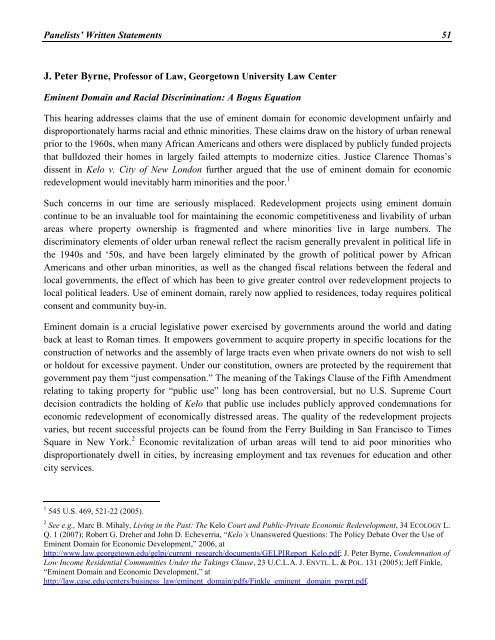Create successful ePaper yourself
Turn your PDF publications into a flip-book with our unique Google optimized e-Paper software.
Panelists’ Written Statements 51J. Peter Byrne, Professor of Law, Georgetown University Law Center<strong>Eminent</strong> <strong>Domain</strong> and Racial Discrimination: A Bogus EquationThis hearing addresses claims that the use of eminent domain for economic development unfairly anddisproportionately harms racial and ethnic minorities. These claims draw on the history of urban renewalprior to the 1960s, when many African Americans and others were displaced by publicly funded projectsthat bulldozed their homes in largely failed attempts to modernize cities. Justice Clarence Thomas’sdissent in Kelo v. City of New London further argued that the use of eminent domain for economicredevelopment would inevitably harm minorities and the poor. 1Such concerns in our time are seriously misplaced. Redevelopment projects using eminent domaincontinue to be an invaluable tool for maintaining the economic competitiveness and livability of urbanareas where property ownership is fragmented and where minorities live in large numbers. Thediscriminatory elements of older urban renewal reflect the racism generally prevalent in political life inthe 1940s and ‘50s, and have been largely eliminated by the growth of political power by AfricanAmericans and other urban minorities, as well as the changed fiscal relations between the federal andlocal governments, the effect of which has been to give greater control over redevelopment projects tolocal political leaders. Use of eminent domain, rarely now applied to residences, today requires politicalconsent and community buy-in.<strong>Eminent</strong> domain is a crucial legislative power exercised by governments around the world and datingback at least to Roman times. It empowers government to acquire property in specific locations for theconstruction of networks and the assembly of large tracts even when private owners do not wish to sellor holdout for excessive payment. Under our constitution, owners are protected by the requirement thatgovernment pay them “just compensation.” The meaning of the Takings Clause of the Fifth Amendmentrelating to taking property for “public use” long has been controversial, but no U.S. Supreme Courtdecision contradicts the holding of Kelo that public use includes publicly approved condemnations foreconomic redevelopment of economically distressed areas. The quality of the redevelopment projectsvaries, but recent successful projects can be found from the Ferry Building in San Francisco to TimesSquare in New York. 2 Economic revitalization of urban areas will tend to aid poor minorities whodisproportionately dwell in cities, by increasing employment and tax revenues for education and othercity services.1 545 U.S. 469, 521-22 (2005).2 See e.g., Marc B. Mihaly, Living in the Past: The Kelo Court and Public-Private Economic Redevelopment, 34 ECOLOGY L.Q. 1 (2007); Robert G. Dreher and John D. Echeverria, “Kelo’s Unanswered Questions: The Policy Debate Over the Use of<strong>Eminent</strong> <strong>Domain</strong> for Economic Development,” 2006, athttp://www.law.georgetown.edu/gelpi/current_research/documents/GELPI<strong>Report</strong>_Kelo.pdf; J. Peter Byrne, Condemnation ofLow Income Residential Communities Under the Takings Clause, 23 U.C.L.A. J. ENVTL. L. & POL. 131 (2005); Jeff Finkle,“<strong>Eminent</strong> <strong>Domain</strong> and Economic Development,” athttp://law.case.edu/centers/business_law/eminent_domain/pdfs/Finkle_eminent_ domain_pwrpt.pdf.


